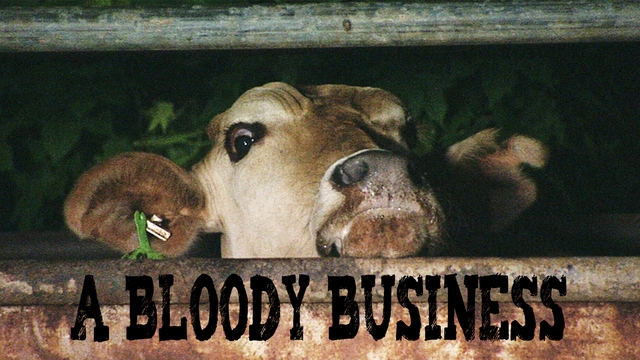In Australia the international trade in live cattle is a huge industry. But hidden behind the dollars is a gruesome and unpalatable truth. Through shocking footage, this explosive exposé reveals the horrifying cruelty inflicted upon the Australian cattle exported to the slaughterhouses of Indonesia.
On a bloodstained floor a thrashing cow is tied to several posts; a topless Indonesian man repeatedly whips her over the head until she lies unmoving. Then the cow, unable to move, is kicked repeatedly in the head. On the ground, tied by its feet, another cow's throat is cut. But it doesn't die: for several minutes it thrashes around on the floor, its neck gaping. These are the images the cattle industry didn't want you to see.
"Australian cattle in Indonesia were typically comfortable and generally found to be coping well with the conditions", reads a recent report from the cattle industry of Australia. Yet these pictures, taken by animal welfare campaigners following the January report, tell the real story of thousands of animals dying slow and hideous deaths.
"To say that that is generally good is just wrong", is the assessment of Temple Grandin, a renowned cattle expert.
The hours of footage reveal that Australian training of the slaughter men in Indonesia has been grossly inadequate. Animals smash their heads repeatedly on concrete as they struggle against ropes, taking minutes to die in agony after repeated, often clumsy, cuts to the throat. In some cases there is abject and horrifying cruelty - kicking, hitting, eye gouging and tail-breaking - as workers try to force the cattle to go into the slaughter boxes installed by the Australian industry, with Australian Government support.
"If the government of Australia is providing these horrible facilities something is really wrong", Gradin says, her face grimacing with revulsion.
Australia sends about 500,000 cattle there each year in a trade worth more than $300 million. Six million cattle have been sent to Indonesia since the trade began two decades ago, supplying a growing demand for beef. It's a big business, which the cattle industry is worried about losing.
"Yeah, Indonesia really is our key market player by a long way", explains Ken Warriner, CEO of the Consolidated Pastoral Company. It insists its training programmes in Indonesia are effective, however the footage shows cattle being subjected to a range of horrifying acts of brutality, mostly the result of the workmen's inability to handle the cattle inside the processing plants.
Many cattlemen have admitted that abuses do go on but insist that the partnership with Indonesia is essential and that over time things will get better.
"As we move forward things will improve", says Greg Pankhurst, who runs a large Indonesia feedlot. But after 18 years of not righting the wrongs some are now questioning the current policy:
"You can't accept those images; if we can't get over that we don't deserve to be there", admits Ken Warriner. Yet the question remains: how much suffering must these animals endure for the sake of profit before anything is done?
Warning - Contains shocking footage of animal cruelty.
LEARN MORE.
WATCH MORE.
JOIN THE DISCUSSION.
 In Australia the international trade in live cattle is a huge industry. But hidden behind the dollars is a gruesome and unpalatable truth. Through shocking footage, this explosive exposé reveals the horrifying cruelty inflicted upon the Australian cattle exported to the slaughterhouses of Indonesia.
In Australia the international trade in live cattle is a huge industry. But hidden behind the dollars is a gruesome and unpalatable truth. Through shocking footage, this explosive exposé reveals the horrifying cruelty inflicted upon the Australian cattle exported to the slaughterhouses of Indonesia.


